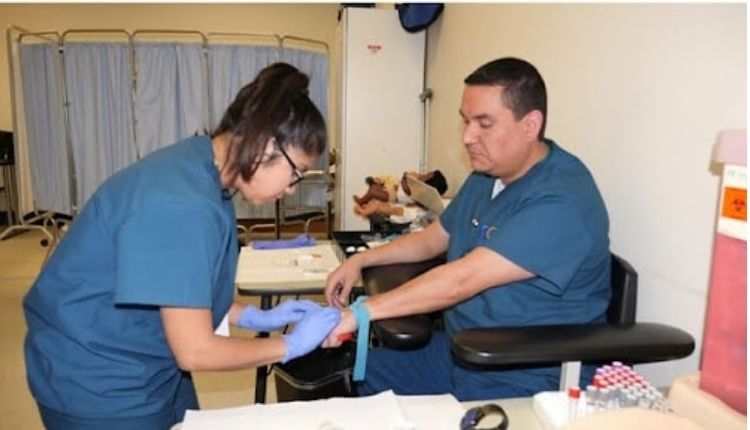
Lab Assistant, EKG Technician, and Phlebotomist Training
Lab Assistants, EKG Technicians, and Phlebotomists are members of a healthcare team responsible for the collection and processing of lab specimens. Lab Assistants collect samples from patients including blood, urine, stool, sputum, tissue biopsy samples, and other body fluids. Lab Assistants label specimens according to patient identifiers and document the amounts and types of specimens for laboratory processing.
Lab Assistants often receive test requisitions from a physician or a nurse to be completed by Lab Assistants that provide background information about the patient being tested, including any allergies, medications being taken, and the location of any abnormal findings. Lab Assistants also prepare sterile containers holding various fluids needed during the testing process. Lab Assistants are also responsible for operating laboratory equipment including centrifuges, mixers, and washers to separate cells from body fluids or tissues.
Lab Assistants may be required to enter patient information into a computer system that tracks tests ordered, results obtained, and action taken according to the test results. Lab Assistants also clean and sterilize laboratory equipment after completion of each test. Lab Assistants also stock lab supplies and maintain inventory records according to predetermined specifications.
EKG Technicians operate EKG (electrocardiograph) equipment to capture, store, and analyze EKGs. EKGs are used to assess electrical activity in the heart and reveal disturbances in rhythm (arrhythmias). E
KG Technicians sterilize EKG equipment after each use. Some EKGs supplies are disposable and must be replaced after use. Phlebotomists prepare patient samples for lab testing by collecting blood, urine, stool, sputum, or tissue biopsy specimens. Phlebotomists label specimens according to patient information and document the type and amount of specimen collected. Phlebotomists enter information about patient specimens into a laboratory information system to track the types, amounts, and location of specimens for each patient or test order. Phlebotomists are responsible for ordering supplies needed to collect patients samples. Phlebotomists also clean work areas, equipment, and supplies after processing specimens. Phlebotomists are responsible for ensuring the proper procedures are followed according to OSHA guidelines and standard safety practices.
Phlebotomists may also transport patient samples to the lab. Phlebotomists work in many locations including hospitals, clinics, physician’s offices, research facilities, scientific laboratories, blood donor centers, and blood banks. Phlebotomists work shifts including days, evenings, nights, weekends, and holidays as scheduled by the employer. Phlebotomist’s salary is usually dependent upon years of experience in the field as well as training and certification available through national organizations such as the American Society for Clinical Pathology Board of Certification (ASCP-BOC) and the American Phlebotomy Association (APA). Phlebotomists that work in hospitals, blood banks, or clinics may be eligible for health insurance benefits. Phlebotomist’s job outlook is projected to increase as the population increases and more people require lab testing.
As of 2010, the average phlebotomist’s salary is $24,740 per year. The median pay for phlebotomists is $22,000 per year. The lowest 10% of phlebotomists earn less than $17,970 annually while the highest 10% of phlebotomists earn more than $37,000 annually.
NCE’s Lab Assistant, EKG Technician, and Phlebotomist program prepares students for success in a variety of entry-level positions. NCE students learn to perform many important procedures, including laboratory procedures for hematology, bacteriology, urinalysis, electrocardiography, and phlebotomy. NCE’s program provides hands-on training for real-world, practical experience. Students are prepared for tasks inside the laboratory, and also develop their interpersonal skills, including the communication skills required to work with patients as well as others in the workplace.




